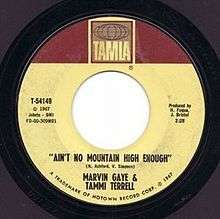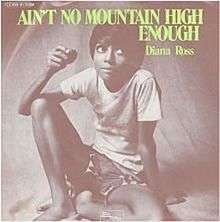Ain't No Mountain High Enough
"Ain't No Mountain High Enough" is a pop/soul song written by Nickolas Ashford & Valerie Simpson in 1966 for the Tamla label, a division of Motown. The composition was first successful as a 1967 hit single recorded by Marvin Gaye and Tammi Terrell, and became a hit again in 1970 when recorded by former Supremes frontwoman Diana Ross. The song became Ross's first solo number-one hit on the Billboard Hot 100 chart and was nominated for a Grammy Award.
| "Ain't No Mountain High Enough" | ||||
|---|---|---|---|---|
 | ||||
| Single by Marvin Gaye & Tammi Terrell | ||||
| from the album United | ||||
| B-side | "Give a Little Love" | |||
| Released | April 20, 1967 | |||
| Recorded | December 1966 – February 1967 | |||
| Studio | Hitsville USA, Detroit, Michigan | |||
| Genre | Pop, soul | |||
| Length | 2:28 | |||
| Label | Tamla (T-54149) | |||
| Songwriter(s) | ||||
| Producer(s) | ||||
| Marvin Gaye & Tammi Terrell singles chronology | ||||
| ||||
History
Marvin Gaye and Tammi Terrell original
The song was written by Ashford and Simpson prior to joining Motown. British soul singer Dusty Springfield wanted to record the song but the duo declined, hoping it would give them access to the Detroit-based label. As Valerie Simpson later recalled, "We played that song for her (Springfield) but wouldn't give it to her, because we wanted to hold that back. We felt like that could be our entry to Motown. Nick called it the 'golden egg'."[1] Dusty recorded a similar verse melody in 'I'm Gonna Leave You' on Dusty.
The original 1967 version of "Ain't No Mountain High Enough" was a top twenty hit. According to record producers, Terrell was a little nervous and intimidated during the recording sessions because she did not rehearse the lyrics. Terrell recorded her vocals alone with producers Harvey Fuqua and Johnny Bristol, who added Gaye's vocal at a later date.[2] "Ain't No Mountain" peaked at number nineteen on the Billboard pop charts, and went to number three on the R&B charts.[3]
This original version of "Ain't No Mountain", produced by Fuqua and Bristol, was a care-free, danceable, and romantic love song that became the signature duet between Gaye and Terrell. Its success led to a string of more Ashford/Simpson penned duets (including "You're All I Need to Get By", "Ain't Nothing Like the Real Thing", and "Your Precious Love").
The Gaye/Terrell version was inducted into the Grammy Hall of Fame in 1999, and is regarded today as one of the most important records ever released by Motown.
Personnel
- All vocals by Marvin Gaye and Tammi Terrell
- Instrumentation by the Funk Brothers and Detroit Symphony Orchestra
The Supremes and Temptations version
Diana Ross & the Supremes recorded a version of "Ain't No Mountain High Enough" which was more faithful to the Terrell-Gaye original version as a duet with the Temptations. That song was an album cut from a joint LP released by Motown Records in 1968 on the two superstar groups, titled Diana Ross & the Supremes Join the Temptations.
Diana Ross solo version
| "Ain't No Mountain High Enough" | ||||
|---|---|---|---|---|
 | ||||
| Single by Diana Ross | ||||
| from the album Diana Ross | ||||
| B-side | "Can't It Wait Until Tomorrow" | |||
| Released | July 16, 1970 | |||
| Recorded | March 13, 14, and 18, 1970 | |||
| Studio | Hitsville USA (Studio A), Detroit, Michigan | |||
| Genre | Soul | |||
| Length |
| |||
| Label | Motown (M 1169) | |||
| Songwriter(s) | Nickolas Ashford & Valerie Simpson | |||
| Producer(s) | Nickolas Ashford & Valerie Simpson | |||
| Diana Ross singles chronology | ||||
| ||||
In spring 1970, after the Top 20 success of her first solo single, "Reach Out and Touch (Somebody's Hand)", Ashford and Simpson had Ross re-record "Ain't No Mountain High Enough". Initially, Ross was apprehensive, but was convinced to make the recording. The remake was similar to gospel with elements of classical music strings (provided by the Detroit Symphony Orchestra), spoken word passages from Ross, with the Andantes, Jimmy Beavers, Jo Armstead, Ashford & Simpson and Brenda Evans and Billie Calvin of the Undisputed Truth as backing singers, giving the song a soul and gospel vocal element.
Motown chief Berry Gordy did not like the record upon first hearing it. He hated the spoken-word passages and wanted the song to begin with the climactic chorus/bridge. It was not until radio stations nationwide were editing their own versions and adding it to their playlists that Ashford and Simpson were able to convince Gordy to release an edited three-minute version as a single. Ross's version of "Ain't No Mountain High Enough" rose up to number one on both the pop and R&B singles charts.[4] Ross received a Grammy nomination for Best Female Pop Vocal Performance. This version is in the key of C minor for most of the song, then towards the end, the key changes to F sharp major.
In 2017, "Ain't No Mountain High Enough" was remixed by Eric Kupper, StoneBridge and Chris Cox, amongst others, on Motown/UMe.[5] The new remix went to number one on the Billboard Dance Club Songs chart.[6]
Chart history
Notable remakes and usage in media
- In 1981, American disco band Inner Life from Salsoul Records released their version, which topped #20 on US Dance Chart.[11] It is particularly noted for the 10 minute Larry Levan remix.
- In 1981, the Boys Town Gang formed a medley of the two songs "Remember Me" and "Ain't No Mountain High Enough". The single was a club hit.
- In 1991, Australian singer Jimmy Barnes released an album of soul remakes titled Soul Deep, including his rock version of "Ain't No Mountain High Enough". His version reached #28 in Australia in 1992.[12]
- In 1993, the film Sister Act 2: Back in the Habit, incorporates a unique mashup cover version, in which the verses and chorus of the song contain the original Marvin Gaye and Tammi Terrell version, whereas the Diana Ross version's bridge, chorus and ending are used. It is performed by Whoopi Goldberg and the rest of the cast.
- The song was used in the 1999 film Our Friend, Martin performed by Debelah Morgan
- In 2000, Dutch airline carrier KLM used the Supremes/Temptations version in a commercial.
- Also in 2000, Disney featured the song in the sports drama film Remember the Titans.
- In 2001, the Diana Ross version was featured in the film Bridget Jones's Diary.
- In 2003, Michael McDonald recorded a version of the song for his cover album Motown.
- In 2005, the Diana Ross version was featured at the end of the animated film Chicken Little.
- Amy Winehouse used the backing of the song in "Tears Dry on Their Own" in her 2006 second and final album, Back to Black.
- In 2009, Lucy Hale and Courtney Thorne-Smith performed a cover of the song from the television film Sorority Wars.
- In 2018, a remix of the Diana Ross version reached #1 on the US Dance Club Songs chart.[13]
References
- "Valerie Simpson interview; Ashford and Simpson remembered". Chicago Tribune.
- Chin, Brian (2001). Liner notes for Marvin Gaye & Tammi Terrell: The Complete Duets. New York: Motown Records/UMG Recordings.
- Whitburn, Joel. The Billboard Book of Top 40 R&B and Hip-Hop Hits. New York, NY: Billboard Books, 2006. Print.
- Whitburn, Joel (2004). Top R&B/Hip-Hop Singles: 1942–2004. Record Research. p. 501.
- "Diana Ross – Ain't No Mountain High Enough / Can't It Wait Until Tomorrow". discogs. Retrieved December 18, 2017.
- "Dance Club Songs – January 20, 2018". Billboard. January 16, 2018. Retrieved January 16, 2018.
- [Joel Whitburn's Top Pop Singles 1955–2002]
- "Top 100 1970-09-26". Cashbox Magazine. Retrieved 2016-05-27.
- "Item Display - RPM - Library and Archives Canada". collectionscanada.gc.ca.
- "Top 100 Hits of 1970/Top 100 Songs of 1970". Musicoutfitters.com. Retrieved September 30, 2016.
- "Allmusic: Inner Life – Awards". Billboard. Retrieved February 23, 2016.
- Chart Position @ Australian-Charts.com Retrieved May 3, 2009
- https://www.billboard.com/music/diana-ross/chart-history/DSI